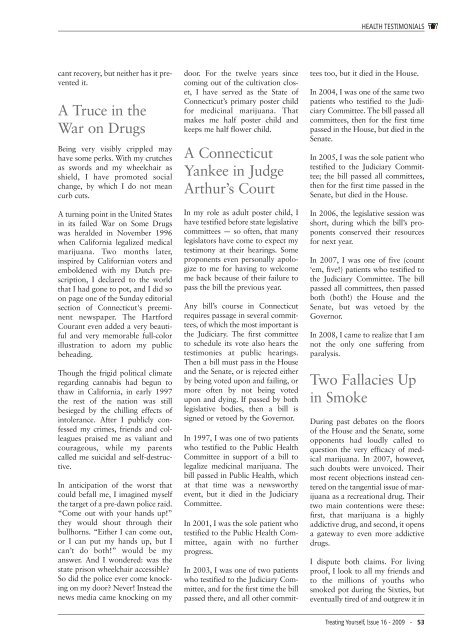Create successful ePaper yourself
Turn your PDF publications into a flip-book with our unique Google optimized e-Paper software.
cant recovery, but neither has it prevented<br />
it.<br />
A Truce in the<br />
War on Drugs<br />
Being very visibly crippled may<br />
have some perks. With my crutches<br />
as swords and my wheelchair as<br />
shield, I have promoted social<br />
change, by which I do not mean<br />
curb cuts.<br />
A turning point in the United States<br />
in its failed War on Some Drugs<br />
was heralded in November 1996<br />
when California legalized medical<br />
marijuana. Two months later,<br />
inspired by Californian voters and<br />
emboldened with my Dutch prescription,<br />
I declared to the world<br />
that I had gone to pot, and I did so<br />
on page one of the Sunday editorial<br />
section of Connecticut's preeminent<br />
newspaper. The Hartford<br />
Courant even added a very beautiful<br />
and very memorable full-color<br />
illustration to adorn my public<br />
beheading.<br />
Though the frigid political climate<br />
regarding cannabis had begun to<br />
thaw in California, in early 1997<br />
the rest of the nation was still<br />
besieged by the chilling effects of<br />
intolerance. After I publicly confessed<br />
my crimes, friends and colleagues<br />
praised me as valiant and<br />
courageous, while my parents<br />
called me suicidal and self-destructive.<br />
In anticipation of the worst that<br />
could befall me, I imagined myself<br />
the target of a pre-dawn police raid.<br />
“Come out with your hands up!”<br />
they would shout through their<br />
bullhorns. “Either I can come out,<br />
or I can put my hands up, but I<br />
can’t do both!” would be my<br />
answer. And I wondered: was the<br />
state prison wheelchair accessible?<br />
So did the police ever come knocking<br />
on my door? Never! Instead the<br />
news media came knocking on my<br />
door. For the twelve years since<br />
coming out of the cultivation closet,<br />
I have served as the State of<br />
Connecticut’s primary poster child<br />
for medicinal marijuana. That<br />
makes me half poster child and<br />
keeps me half flower child.<br />
A Connecticut<br />
Yankee in Judge<br />
Arthur’s Court<br />
In my role as adult poster child, I<br />
have testified before state legislative<br />
committees — so often, that many<br />
legislators have come to expect my<br />
testimony at their hearings. Some<br />
proponents even personally apologize<br />
to me for having to welcome<br />
me back because of their failure to<br />
pass the bill the previous year.<br />
Any bill’s course in Connecticut<br />
requires passage in several committees,<br />
of which the most important is<br />
the Judiciary. The first committee<br />
to schedule its vote also hears the<br />
testimonies at public hearings.<br />
Then a bill must pass in the House<br />
and the Senate, or is rejected either<br />
by being voted upon and failing, or<br />
more often by not being voted<br />
upon and dying. If passed by both<br />
legislative bodies, then a bill is<br />
signed or vetoed by the Governor.<br />
In 1997, I was one of two patients<br />
who testified to the Public Health<br />
Committee in support of a bill to<br />
legalize medicinal marijuana. The<br />
bill passed in Public Health, which<br />
at that time was a newsworthy<br />
event, but it died in the Judiciary<br />
Committee.<br />
In 2001, I was the sole patient who<br />
testified to the Public Health Committee,<br />
again with no further<br />
progress.<br />
In 2003, I was one of two patients<br />
who testified to the Judiciary Committee,<br />
and for the first time the bill<br />
passed there, and all other commit-<br />
HEALTH TESTIMONIALS<br />
tees too, but it died in the House.<br />
In 2004, I was one of the same two<br />
patients who testified to the Judiciary<br />
Committee. The bill passed all<br />
committees, then for the first time<br />
passed in the House, but died in the<br />
Senate.<br />
In 2005, I was the sole patient who<br />
testified to the Judiciary Committee;<br />
the bill passed all committees,<br />
then for the first time passed in the<br />
Senate, but died in the House.<br />
In 2006, the legislative session was<br />
short, during which the bill’s proponents<br />
conserved their resources<br />
for next year.<br />
In 2007, I was one of five (count<br />
‘em, five!) patients who testified to<br />
the Judiciary Committee. The bill<br />
passed all committees, then passed<br />
both (both!) the House and the<br />
Senate, but was vetoed by the<br />
Governor.<br />
In 2008, I came to realize that I am<br />
not the only one suffering from<br />
paralysis.<br />
Two Fallacies Up<br />
in Smoke<br />
During past debates on the floors<br />
of the House and the Senate, some<br />
opponents had loudly called to<br />
question the very efficacy of medical<br />
marijuana. In 2007, however,<br />
such doubts were unvoiced. Their<br />
most recent objections instead centered<br />
on the tangential issue of marijuana<br />
as a recreational drug. Their<br />
two main contentions were these:<br />
first, that marijuana is a highly<br />
addictive drug, and second, it opens<br />
a gateway to even more addictive<br />
drugs.<br />
I dispute both claims. For living<br />
proof, I look to all my friends and<br />
to the millions of youths who<br />
smoked pot during the Sixties, but<br />
eventually tired of and outgrew it in<br />
<strong>Treating</strong> <strong>Yourself</strong>, <strong>Issue</strong> 16 - 2009 - 53



